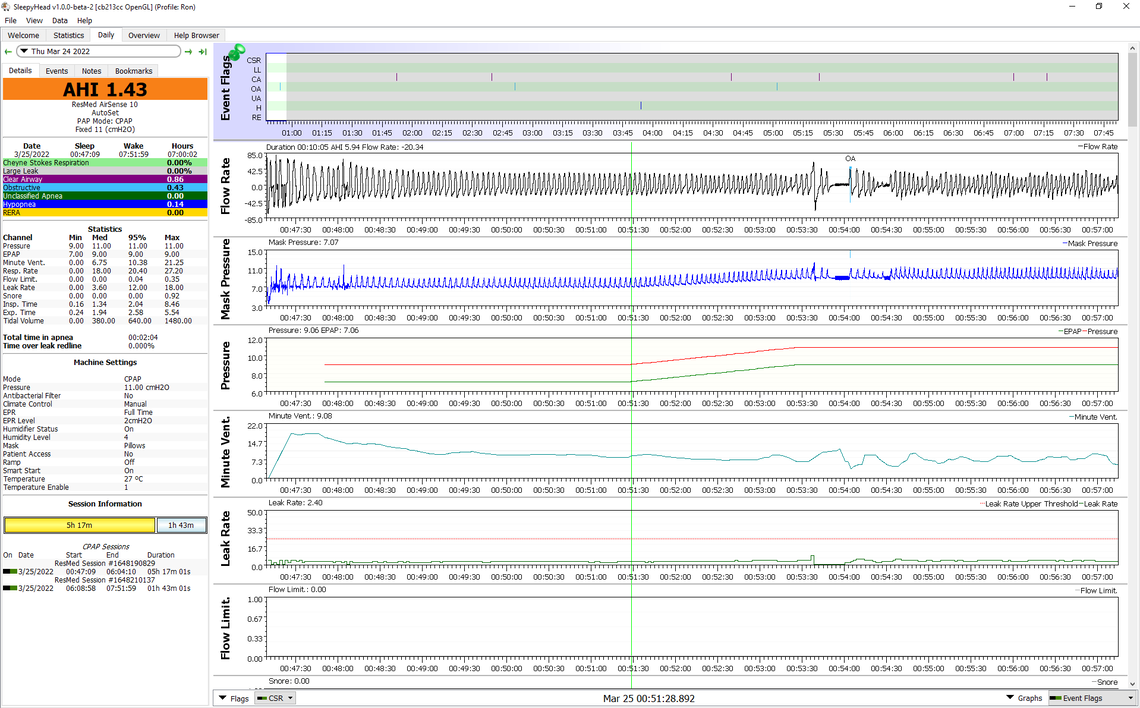Hello
I am suffering from a very specific kind of sleep apnea that seems to be under-studied and not taken seriously by the medical establishment.
A couple years ago I was diagnosed with OSA. I was prescribed CPAP, and did several sleep studies, both at home and in-lab. All the studies I have done have shown I have primarily OSA, with a few Central events. The CPAP seems to be working-- my AHI with CPAP is less than 1. My sleep doctor believes that I am fine and my apnea is under control.
But here's the problem... I just can't fall alseep! I am having sleep-onset/ transitional apneas. Every time I nod off to sleep, my brain "forgets" to sleep, and I get jolted awake. This will happen throughout the night. Sometimes I will go the entire night without sleeping, even though I feel sleepy.
My general doctor prescribed meds for anxiety and sleep, and I have been taken them. They make me less anxious, but I still get woken up by the transitional apneas. My sleep doctor doesn't believe me that I even have a problem, since my AHI is so low, and all the data seems to indicate that my apnea is treated. She claims it's just anxiety, but even after taking medication for anxiety, and doing everything I can to try to relax, I'm still having these apneas.
I don't feel anxious when I go to bed. But after several hours of gettting woken up every time I start to nod off, I feel annoyed. My CPAP machine doesn't even register most of these events because they generally last less than 10 seconds. Usually the AHI on my CPAP still reads 0.0 after these episodes.
Right now it's 2:40am. I went to bed around 11:30pm. Ended up taking my sleeping meds, plus melatonin, plus several doses of nyquil, plus some benedryl, because I just can't fall alseep. Maybe I should just accept the fact that I will never sleep again because my doctors seem to think that there is no problem since my AHI is so low.
Lots of posts on here seem to claim that this issue is caused by anxiety, but I don't believe it. I'm not feeling anxious. I'm just feeling tired of not being able to sleep. The anxiety meds did not cure my central apneas. The only thing I am really REALLY feeling stressed about is feeling like my doctor is not taking my transitional apneas seriously.
Have you looked at your CPAP data with OSCAR to see what is actually happening when you are going to sleep? Your are correct that the CPAP will not report an apnea of less than 10 seconds, or any apnea during the pressure ramp period. But with OSCAR you can zoom in and manually look for apnea events whether they are flagged or not. You may even be able to tell what type of events they are even when they are not flagged by the CPAP. I do not suffer from this issue but I went back over my recent nights to see if I could find a time when I had an apnea event early during the going to sleep period of the night. Here is a screenshot of one night when I had an early event.

I have an AirSense 10 and use the Ramp set on Auto. It detects when I go sleep and then ramps pressure up from the ramp hold pressure (9cm) to my treatment pressure (11 cm). You can see where the green vertical cursor is that the pressure starts to increase. Shortly after it reaches 11 cm I get an obstructive event which lasted long enough to be flagged. And very shortly after that there is a second event which occurs but is not flagged. This gives a sense of what you can look at with OSCAR. The free software requires a PC or Mac and a SD card reader.
As far as measures to control it, I would look to see what type of event it is, and if it is obstructive then you may want to consider a higher ramp start pressure and/or higher minimum pressure on your machine. The idea would be to get the pressure up as quickly as possible to prevent the airway from obstructing and causing you to wake up.